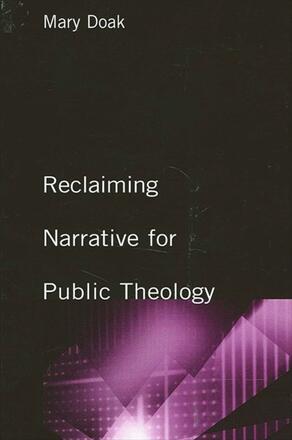Acknowledgments
1. INTRODUCTION: THE IDEA OF A NARRATIVE PUBLIC THEOLOGY
Narrative as a Resource for Historicizing Theology
The Public Theology Project
Why Call It Public Theology?
Achievements in Public Theology Thus Far
The Public Character of Narrative
How This Argument Will Proceed
2. PUBLIC THEOLOGY IN A PLURALISTIC SOCIETY
Arendt's Defense of a Pluralistic Public Life
Public Life as Resistance to Totalitarianism
The Nature of Public Life and Action
Is Christianity Inherently Antipublic?
Conclusion
Public Theology without Establishment of Religion
The Complex Meaning of Religious Freedom
Case #1. The Ten Commandments
Religious Morality and the Limits of Legislation
Case #2: Lawrence v. Texas and the Legislation of Morality
Religious Freedom and Public Debate
Public Theology Amidst Diversity
3. E PLURIBUS UNUM? NATIONAL NARRATIVES AND THE RECOVERY OF PUBLIC LIFE
Introduction: Why Nations and Why Narratives?
A Defense of Public Life on the National Level
Arguments Against the Nation-State
A Qualified Defense of the Nation-State
National Identity
Historical Narratives and the Nation-State
National Narratives and the Repression of the Other
Ricoeur's Theory of Narrative
The Structure of Narrative
The Narrative Structure of Historical Understanding
Identity and Purpose as Conceptualized through Historical and Fictional Narratives
Bifurcated Histories or a Common Narrative
Conclusion
4. TOWARD A NARRATIVE PUBLIC THEOLOGY
Narrative in a Practical Fundamental Theology: J. B. Metz
A Narrative, Practical Approach to Fundamental Theology
Human Freedom in History
Theology and the Critique of Narratives
Metz's Contributions to Public Theology
North American Narrative Theologians: Stanley Hauerwas and Ronald Thiemann
A Narrative Theological Ethics: Stanley Hauweras
Narrative as the Basis of Communal Identity
The Christian Task in History
The Public Mission of the Church
The Christian Narrative and Public Discourse
Hauerwas's Contributions and Challenges to a Narrative Public Theology
A Public Narrative Theology: Ronald Thiemann
Thiemann's Argument for Public Theology
Why Narrative in This Public Theology?
Thiemann's Proposal for a Theological Method
Thick Descriptions and Public Debate
Oppositional or Publicly Engaged Theology?
Conclusion: Towards a Narrative Public Theology
The Importance of Narrative in Christian Theology
A Double Narrative Construction for Public Theology
Narrative and Public Debate
5. Lincoln, Elizondo, and Williams as Narrative Public Theologians
The Argument for a Narrative Public Theology Summarized
Abraham Lincoln: Narrating Judgment
The Narrative Structure in the Gettysburg Address and the Second Inaugural Address
Public Theology or Civil Religion?
Lincoln's Contributions to a Narrative Public Theology
Virgil Elizondo: Narrating Mestizaje
Three Levels of Narrative
Elizondo's Contributions to a Narrative Public Theology
Delores Williams: Narrating Resistance
Narrating a Womanist Theology
Williams's Contributions to a Narrative Public Theology
Conclusion
Notes
Index
